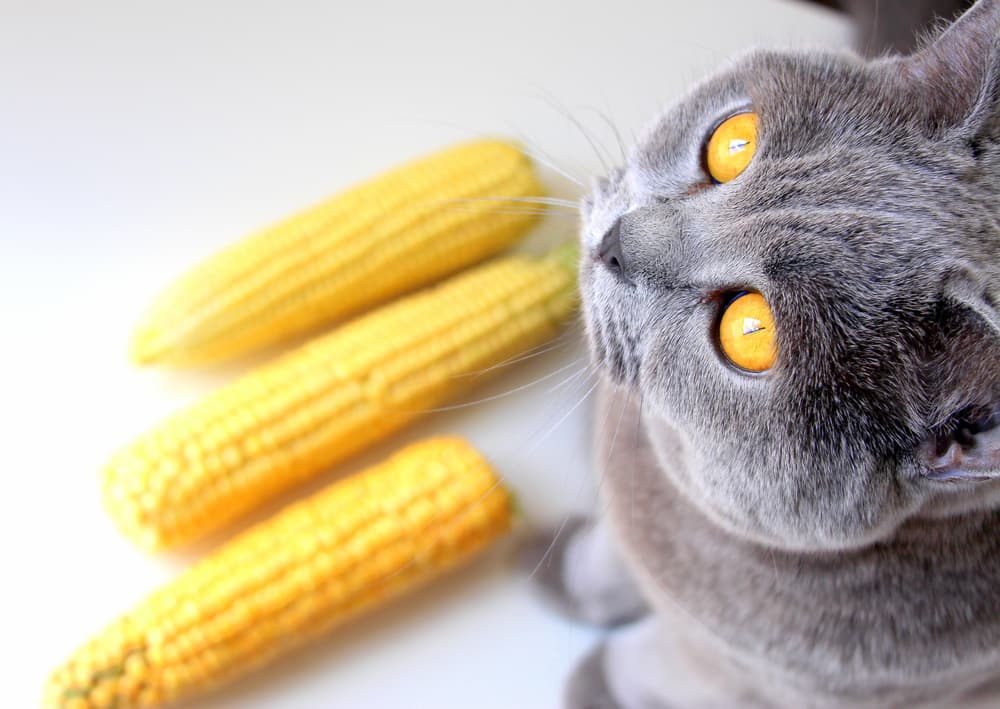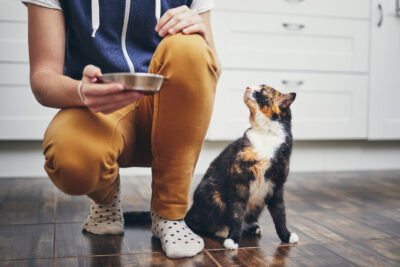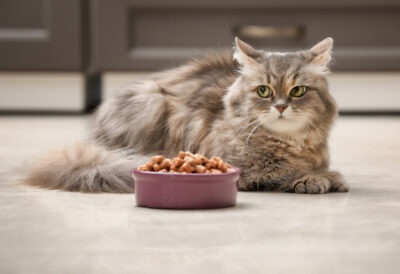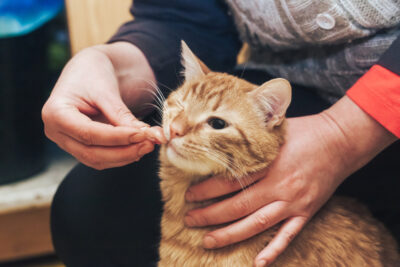Can Cats Eat Corn?

As the largest crop grown in America has shown, many of us like corn—especially when it’s slathered with butter and covered in salt. In fact, one plant biologist called humans “walking corn chips” because so much of our diet is derived from the wholesome, easy-to-grow grain.
But if you’re wondering: can cats eat corn? You’re not alone. Many feline pet parents have the same question.
Before you feed, hold onto that cob. Read on to learn whether or not cats can eat corn, if corn has any benefits for our feline friends, and what you should know before sharing corn-based dishes with your pet.
Can Cats Eat Corn?
Yes! Cats can indeed eat corn. “Corn is a highly nutritious carbohydrate source that’s found in many manufactured cat foods,” says Dr. Nancy Welborn, an assistant professor of veterinary clinical sciences at the LSU School of Veterinary Medicine in Baton Rouge.
However, just because corn is found in well-balanced, veterinarian-approved cat foods, that doesn’t mean it’s something you should go out of your way to feed your pet. “Cats are obligate carnivores,” explains Dr. Welborn, “which basically means they need a higher concentration of protein in their diets.”
A little bit of carbs in a cat’s diet, corn included, is okay. But a lot is not. To live her best life, your cat needs kitty chow with the right balance of macronutrients and a hearty portion of high-quality protein. Additional treats or supplements are rarely beneficial.
Can Cats Eat Corn on the Cob?

Cats can technically eat corn on the cob. That said, it’s best to keep this treat in the “human food” category. Most of the time, corn on the cob is covered in salt, oil or fat, and seasonings—none of which are great for cat consumption.
In this case, even a couple of licks can be a calorie bomb, especially considering how few calories the average cat’s compact body needs. Cats aren’t going to a job or the gym with you every day, so those extra calories can add up quickly. In fact, more than half of cats in the U.S. are overweight or obese, and overfeeding can lead to additional health problems over time like diabetes, says Dr. Welborn.
But there’s a reason why videos of cats eating corn on the cob are a rarity. Compared to dogs, cats are much less likely to beg for a taste anyway—so they won’t even know what they’re missing. Keep corn husks and cobs off the menu, too; toys designed for cats to gnaw on are a safer option for a happy cat.
Can Cats Eat Corn Tortillas?
Keep corn tortillas off the menu for cats, too. They’re a high-calorie snack and don’t offer the right balance of proteins, fats, and carbs for the optimal feline diet.
Can Cats Eat Corn Chips?
Corn chips are another no-no for cats. Processed foods tend to be high in calories and contain ingredients your cat doesn’t need in her diet.
Can Cats Eat Cornbread?
While we all want to treat our pets and make them feel included, cornbread is another human food you can skip sharing with your cat for the same reasons you’d keep these other corn-based dishes out of her diet.
Are There Benefits of Cats Eating Corn?
Corn is found in many cat foods because it’s an inexpensive, healthful source of kitty fuel. The grain offers up nutrients including fiber, protein, and fatty acids, says Dr. Welborn. And corn byproducts found in kibble can help boost the palatability (a.k.a. tastiness) of food and support healthy digestion.
Is Corn Bad For Cats?
As the base for high-fructose corn syrup and other high-calorie, highly-processed foods, corn doesn’t always get the best rap in the human diet or the feline diet.
But the good news is, corn and corn products are rarely bad for cats. Here are the answers to some of the most common corn-related concerns.
Does corn provide empty calories for cats?
There’s a common misconception that corn’s just a “filler” in pet foods that crowds cats’ bellies with empty calories. But the research does not back up this belief, per an article published in Critical Reviews in Food Science and Nutrition. As mentioned above, corn can be a nutritious part of a cat’s diet and is found in many veterinarian-approved cat foods.
Is corn gluten meal bad for cats?
With the rise of “grain-free” diets and human concerns like food allergies and gluten intolerances, you may wonder if similar health problems could affect your pet. However, veterinary reports show the main cause of allergies in cats is actually from protein-based foods; grain-based foods are at the root of less than 1.5% of all food allergy cases. Honestly, “grain-free” is just a marketing term, says Dr. Welborn. (And even pet foods that claim to be grain-free may not be! One supposedly grain-free cat food, for example, was found to contain barley, according to a study by veterinarians at Tufts University.)
Feeding Cats Corn: Tips to Consider

When it comes to cats and corn, there are two key rules to keep in mind, according to Dr. Welborn:
- Everything in moderation. Avoid extra corn products in your cat’s diet, especially if she is overweight. Occasionally, plain corn is okay as long as there’s no salt, butter, oil, or seasonings on it.
- But generally, just stick with cat food. For enrichment and training, opt for veterinarian-approved treats that are designed specifically for cats. Another cost-effective option? Simply take a portion of your cat’s kibble out of the bowl so you know she’s getting in the usual amount of calories she needs to stick with a healthy, balanced diet.
The Bottom Line on Corn for Cats
All in all, corn is rarely bad for cats. In fact, it’s a common ingredient that provides nutritional value in many high-quality cat foods. But if you’re worried something in your cat’s diet could be making her sick due to concerning symptoms like an upset stomach or diarrhea, by all means, contact your veterinarian. It’s better to figure out what’s going on together with a full exam than to try to rework your cat’s diet on your own.









